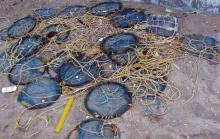In many parts of India—particularly in small or traditional fish landing areas, fisheries data are either unreliable or nonexistent. Data on boats, gear and mesh sizes, crew sizes, time spent fishing, tc., are available at very coarse scales and additionally, poor taxonomic identification of fish species, limited abundance and size class information further compounds the issues that confront fisheries managers. The problems in this sector are many. Overfishing, IUU (illegal, unreported
and unregulated) fishing, over capacity coupled with management plans with questionable scientific bases are some of the major concerns. The lack of accurate and reliable scientific data significantly contributes to the dearth of information in this sector. Without knowing the most basic information as to what the resource base is, how can fisheries be managed appropriately? Establishing a baseline
which addresses this lack of data with the ability to advise the various facets of fisheries management will be the first of its kind for the Coromandel Coast of India. This baseline can help determine whether changes in the current fisheries support system and existing policies are working
and will also enhance the capacity to have adaptive reforms to better suit the needs of conservation and artisanal fisher folk. This project expands upon the work earlier done as part of the FAO artisanal fisheries project which later continued as an internal effort of FERAL. A baseline over the span of two years has been osuccessfully compiled with craft, gear, crew and fish catch details. Subsequent proposals with more specific conservation objectives will be developed from this
baseline. Scientific communications are presently underway.

